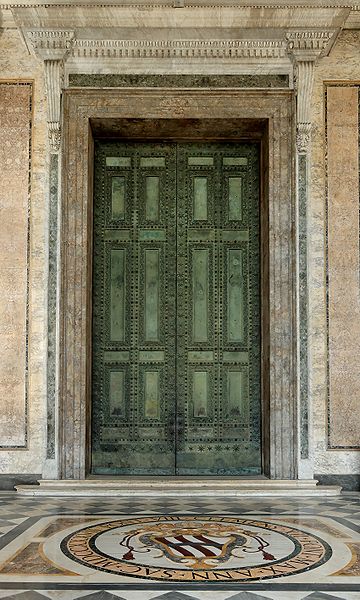Senate (Nova Roma)
(→Senate committees) |
m (Updated senate procedure link) |
||
| Line 37: | Line 37: | ||
The Senate takes its senatus consulta in plenary sessions. In order to prepare them, it may work in committees. They are ordinarily several sessions a year. Nevertheless, the sessions depend on their convocation by a presiding magistrate. | The Senate takes its senatus consulta in plenary sessions. In order to prepare them, it may work in committees. They are ordinarily several sessions a year. Nevertheless, the sessions depend on their convocation by a presiding magistrate. | ||
| − | See the [ | + | See the [http://www.novaroma.org/vici/images/SC_Senate_Rules_rev_3_new.pdf Senate procedures] |
Revision as of 08:59, 25 March 2012
Home | Latíné | Deutsch | Español | Français | Italiano | Magyar | Português | Română | Русский | English
⚜⚜⚜ Site Index - Key Pages ⚜⚜⚜
The Senate of Nova Roma is a council where a select few citizens, mostly former or current magistrates, can discuss the state of the Republic and issue statements on what course of action they perceive most beneficial. These may be advisory or decisive in nature, the latter mostly in regards to appointments. It is said by Polybian theorists to represent the element of Oligarchy in the Roman political equilibrium.
Contents |
Senators (album senatorium)
The senators and their status
Current consuls, praetors, censors and appointed senators are members of the Nova Roman Senate. Senators are appointed by the censors. The list of senators is regularly revised by the censors, but senators are only removed if they bring the Senate into disrepute.
Present and former holders of higher magistracies are not necessarily senators but have the right to participate in meetings of the Senate (the ius sententiae) by virtue of their office. A person who holds a higher magistracy will normally become a senator after his term of office.
Tribunes of the plebs are entitled to attend the sessions of the Senate but don't have the ius sententiae unless they are senators.
The current album senatorium
The current senators are in order of senatorial rank :
| Senatores censorii: | ||
| 1. Fl. Vedius Germanicus, princeps senatus | ||
| 2. Sex. Lucilius Tutor | ||
| 3. Q. Arrius Nauta, decemvir stlitibus iudicandis | ||
| Senatores consulares: | ||
| 4. T. Domitius Draco | ||
| 5. C. Cornelius Cethegus Barosus | ||
| 6. M. Aurelius Cotta Iovius, censor | ||
| 7. C. Petronius Stephanus Turpilianus, censor | ||
| 8. P. Aurelius Barbatus, Quattuorvir rerum curandarum | ||
| 9. C. Flavius Constantinus Aeneas Stilicho | ||
| Senatores praetorii: | ||
| 10. M. Hortensia Maior Fabiana Faustina | ||
| 11. D. Aurelius Ingeniarius, consul | ||
| 12. P. Porcius Licinus | ||
| 13. Ti. Iulius Nerva, Quattuorvir rerum curandarum | ||
| Senatores aedilicii: | ||
| 14. A. Vitellius Celsus | ||
| 15. A. Iulius Paterculus Quattuorvir rerum curandarum | ||
| 16. M. Caecilius Metellus Tocaiensis consul | ||
| 17. Cn. Cornelius Lentulus, triumvir monetalis | ||
| Senatores tribunicii: | ||
| 18. M. Octavius Corvus, triumvir monetalis | ||
| 19. Ap. Curius Rullus | ||
| Senatores quaestorii: | ||
| 20. A. Ocratius Maximus Gittus, tribunus militum comitiatus | ||
| Senatores privati: | ||
| 21. Sibylla Fulvia Ambrosia | ||
| Magistratus et privati cum iure sententiae dicendae: | ||
|---|---|---|
| 22. L. Calpurnius Bestia, praetor, vir aedilicius | ||
| 23. D. Claudius Aquilinus, praetor, vir aedilicius |
Organization of the senatorial work
The Senate takes its senatus consulta in plenary sessions. In order to prepare them, it may work in committees. They are ordinarily several sessions a year. Nevertheless, the sessions depend on their convocation by a presiding magistrate.
See the Senate procedures
Senate plenary sessions
The Sessions of the Senate are reported here, with every senatus consulta discussed, passed or rejected.
Senate committees
Cn. Caesare C. Tullio cos. ‡ MMDCCLXV a.u.c., the Senate As per sections IX. B and IX.C of the SENATUS CONSULTUM ON THE CREATION OF STANDING SENATE COMMITTEES
- The Senate Civic Education Commitee
- The Senate Communications Committee
- The Senate Finance Committee
- The Senate Policy Committee
- The Senate Public Enterprise Committee
Current activity of the Senate
The Senate agenda gives to you access to the items currently discussed by the Senate, or going to be.
Additional information
The Senate Handbook will provide for you all the rules applicable to the Senate.
Roman senate: the Senate in antiquity.
